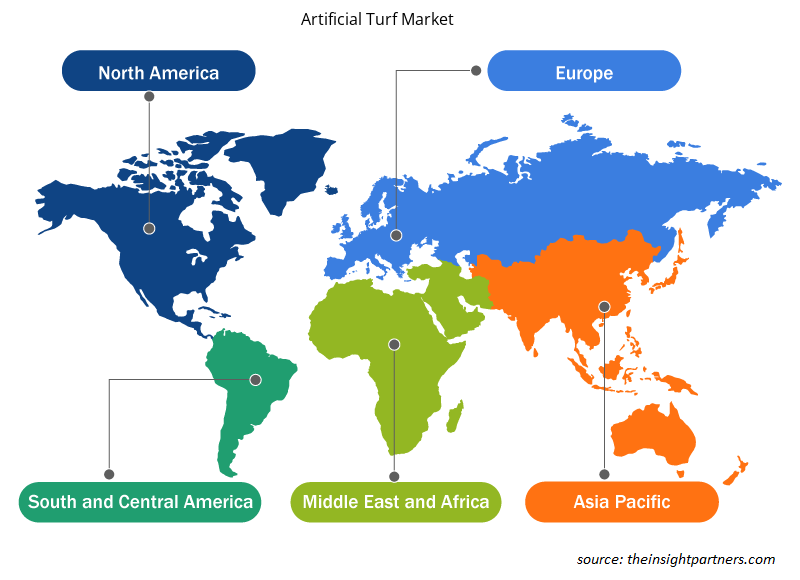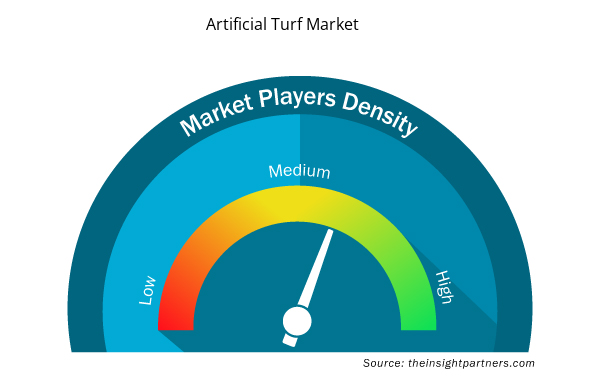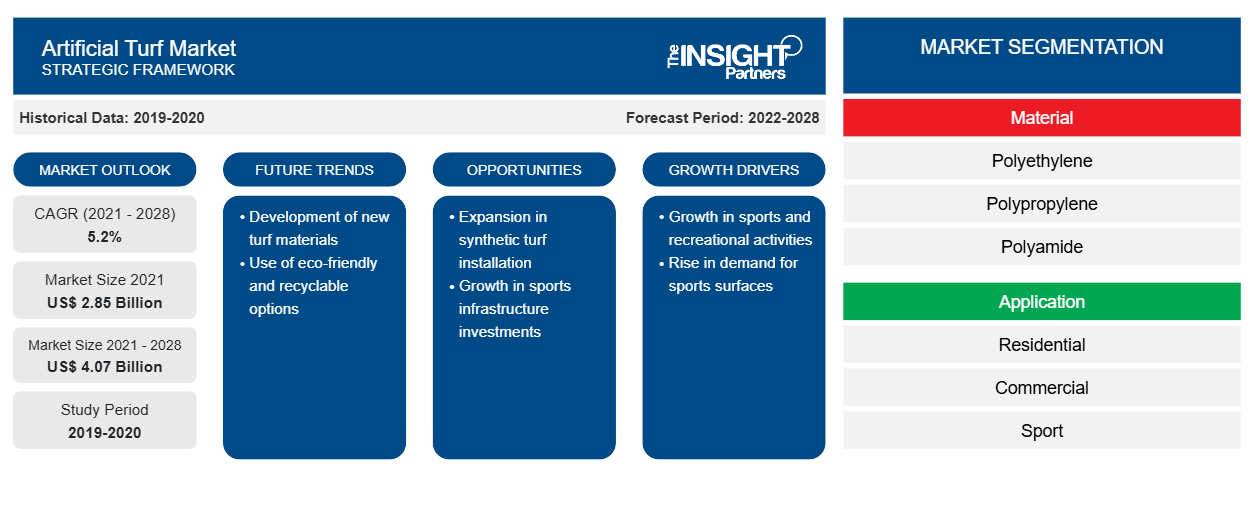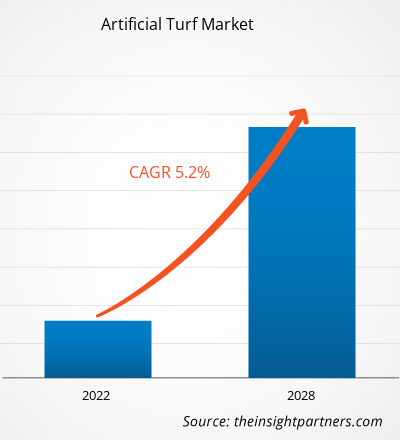Il mercato dell'erba sintetica è stato valutato a 2.847,28 milioni di dollari nel 2021 e si prevede che raggiungerà i 4.067,36 milioni di dollari entro il 2028. Si prevede che crescerà a un CAGR del 5,2% dal 2021 al 2028.
Prodotto da fibre sintetiche, il manto erboso artificiale è fatto per imitare l'erba naturale. Le materie prime per la produzione di manto erboso artificiale includono polietilene (PE), polipropilene (PP), poliammide (nylon), composti di gomma, schiuma di poliestere, diversi colori e altri additivi. La qualità delle materie prime è essenziale per le prestazioni del manto erboso.
Il mercato globale del manto erboso artificiale viene analizzato in base al materiale, all'applicazione e alla geografia. Nel 2020, l'Asia Pacifica ha detenuto la quota di fatturato più grande del mercato globale del manto erboso artificiale. Il fattore principale per la crescita del mercato del manto erboso artificiale nell'Asia Pacifica è il crescente utilizzo del manto erboso artificiale nel settore domestico. I vari vantaggi del manto erboso artificiale come un minor consumo di acqua e sostanze chimiche, una bassa manutenzione, nessuna irrigazione e resistenza alle intemperie, contribuiscono all'elevata domanda di manto erboso artificiale da parte degli impianti sportivi. Inoltre, la crescente globalizzazione e crescita del settore edile favorisce anche la crescita del mercato del manto erboso artificiale. Inoltre, gli operatori di mercato in questa regione hanno investito molto in iniziative di ricerca e sviluppo, contribuendo allo sviluppo di diversi prodotti innovativi, che stanno aiutando questo mercato regionale.
Personalizza questo report in base alle tue esigenze
Riceverai la personalizzazione gratuita di qualsiasi report, comprese parti di questo report, o analisi a livello nazionale, pacchetto dati Excel, oltre a usufruire di grandi offerte e sconti per start-up e università
- Scopri le principali tendenze di mercato in questo rapporto.Questo campione GRATUITO includerà analisi di dati che spaziano dalle tendenze di mercato alle stime e alle previsioni.
Impatto della pandemia di COVID-19 sul mercato dell'erba artificiale
La pandemia di COVID-19 ha portato sfide senza precedenti per molti settori, tra cui l'industria chimica e dei materiali. A causa del blocco nazionale e delle restrizioni alle frontiere, le catene di fornitura sono state completamente interrotte. Ciò ha influenzato la produzione e la distribuzione di vari prodotti. Molte aree ricreative e parchi giochi sono stati chiusi a causa del virus, il che ha causato un picco nei miglioramenti domestici in tutto il mondo. Secondo Synthetic Grass Warehouse, i costruttori di erba sintetica stanno riscontrando guadagni nelle vendite fino al 30% dal 2020. Le applicazioni nei campi sportivi hanno rappresentato il 63% dell'erba sintetica installata nel 2020 e si prevede che rimarranno l'area di applicazione più grande durante il periodo di previsione. Tuttavia, l'erba sintetica nelle applicazioni paesaggistiche sta crescendo a un ritmo rapido. Nel prossimo futuro, si prevede che le piattaforme di e-commerce acquisiranno uno slancio significativo nella vendita di varie materie prime essenziali e non essenziali, in particolare l'erba sintetica.
Approfondimenti di mercato
Crescente domanda di erba artificiale da parte dell'industria sportiva e aumento del numero di stadi
Il manto erboso artificiale è adatto a vari sport, ma è comunemente utilizzato per baseball, football, lacrosse, rugby e calcio. Nel 2021, il Bank of America Stadium ha deciso di passare dall'erba naturale al manto erboso artificiale. Tepper Sports & Entertainment ha annunciato che avrebbe abbandonato l'erba per passare al FieldTurf prima della stagione 2021 dei Carolina Panthers. Il BC Place Stadium avrà anche un nuovo campo in erba sintetica in Canada entro la fine di gennaio 2022. Inoltre, i campi in erba sintetica sono spuntati in città e villaggi in paesi come l'India. Quindi, la crescente domanda di erba sintetica nel settore sportivo e un numero crescente di stadi che utilizzano erba sintetica stanno guidando notevolmente il mercato globale dell'erba sintetica.
Approfondimenti sulle applicazioni
In base all'applicazione, il mercato globale dell'erba sintetica è stato segmentato in residenziale, commerciale e sportivo. Il segmento sportivo ha detenuto la quota maggiore del mercato globale dell'erba sintetica nel 2020. L'erba sintetica è ampiamente utilizzata nei campi sportivi. Viene utilizzata principalmente per fornire una superficie adeguata per gli sport praticati sull'erba in aree in cui è difficile mantenere l'erba naturale o non può crescere. Un'elevata domanda di erba sintetica da parte dell'industria sportiva è dovuta principalmente a vari fattori come la facile manutenzione, più tempo di gioco, ecc.
Alcuni dei principali attori del mercato globale dell'erba sintetica sono The Dow Chemical Company; Tarkett; Act Global; CCGrass; TenCate Grass; SIS Pitches; Victoria PLC; GreenFields BV; HATKO; e Hellas Construction, Inc. Questi attori si concentrano principalmente su diverse strategie, come il lancio di nuovi prodotti, l'espansione, le fusioni e le acquisizioni, per la loro espansione.
Approfondimenti regionali sul mercato dell'erba artificiale
Le tendenze regionali e i fattori che influenzano il mercato dell'erba sintetica durante il periodo di previsione sono stati ampiamente spiegati dagli analisti di Insight Partners. Questa sezione discute anche i segmenti e la geografia del mercato dell'erba sintetica in Nord America, Europa, Asia Pacifico, Medio Oriente e Africa e America meridionale e centrale.

- Ottieni i dati specifici regionali per il mercato dell'erba artificiale
Ambito del rapporto sul mercato dell'erba artificiale
| Attributo del report | Dettagli |
|---|---|
| Dimensioni del mercato nel 2021 | 2,85 miliardi di dollari USA |
| Dimensioni del mercato entro il 2028 | 4,07 miliardi di dollari USA |
| CAGR globale (2021 - 2028) | 5,2% |
| Dati storici | 2019-2020 |
| Periodo di previsione | 2022-2028 |
| Segmenti coperti | Per materiale
|
| Regioni e Paesi coperti | America del Nord
|
| Leader di mercato e profili aziendali chiave |
|
Densità dei giocatori del mercato dell'erba artificiale: comprendere il suo impatto sulle dinamiche aziendali
Il mercato del manto erboso artificiale sta crescendo rapidamente, spinto dalla crescente domanda degli utenti finali dovuta a fattori quali l'evoluzione delle preferenze dei consumatori, i progressi tecnologici e una maggiore consapevolezza dei vantaggi del prodotto. Con l'aumento della domanda, le aziende stanno ampliando le loro offerte, innovando per soddisfare le esigenze dei consumatori e capitalizzando sulle tendenze emergenti, il che alimenta ulteriormente la crescita del mercato.
La densità degli operatori di mercato si riferisce alla distribuzione di aziende o società che operano in un particolare mercato o settore. Indica quanti concorrenti (operatori di mercato) sono presenti in un dato spazio di mercato in relazione alle sue dimensioni o al valore di mercato totale.
Le principali aziende che operano nel mercato dell'erba artificiale sono:
- La società chimica Dow
- Targhetta
- Agire globalmente
- Erba CC
- Erba TenCate
Disclaimer : le aziende elencate sopra non sono classificate secondo un ordine particolare.

- Ottieni una panoramica dei principali attori del mercato dell'erba artificiale
Segnala i riflettori
- Tendenze progressive del settore nel mercato dell'erba artificiale per aiutare i giocatori a sviluppare strategie efficaci a lungo termine
- Strategie di crescita aziendale adottate dai mercati sviluppati e in via di sviluppo
- Analisi quantitativa del mercato dell'erba sintetica dal 2019 al 2028
- Stima della domanda globale di erba artificiale
- Analisi delle cinque forze di Porter per illustrare l'efficacia degli acquirenti e dei fornitori che operano nel settore
- Sviluppi recenti per comprendere lo scenario competitivo del mercato
- Tendenze e prospettive del mercato, nonché fattori che guidano e frenano la crescita del mercato dell'erba artificiale
- Assistenza nel processo decisionale evidenziando le strategie di mercato che sostengono l'interesse commerciale, portando alla crescita del mercato
- La dimensione del mercato dell'erba artificiale in vari nodi
- Panoramica dettagliata e segmentazione del mercato, nonché dinamiche del settore dell'erba artificiale
- Dimensioni del mercato dell'erba artificiale in varie regioni con promettenti opportunità di crescita
Mercato globale dell'erba artificiale
Materiale
- Polietilene
- Polipropilene
- Poliammide
- Altri
Applicazione
- Residenziale
- Commerciale
- Sport
Profili aziendali
- La società chimica Dow
- Targhetta
- Agire globalmente
- Erba CC
- Erba TenCate
- Lanci SIS
- Società per azioni Victoria
- Azienda GreenFields BV
- CAPPELLO
- Società di costruzioni Hellas, Inc.
- Analisi storica (2 anni), anno base, previsione (7 anni) con CAGR
- Analisi PEST e SWOT
- Valore/volume delle dimensioni del mercato - Globale, regionale, nazionale
- Industria e panorama competitivo
- Set di dati Excel



Report Coverage
Revenue forecast, Company Analysis, Industry landscape, Growth factors, and Trends

Segment Covered
This text is related
to segments covered.

Regional Scope
North America, Europe, Asia Pacific, Middle East & Africa, South & Central America

Country Scope
This text is related
to country scope.
Domande frequenti
Europe is estimated to register the fastest CAGR in the global artificial turf market over the forecast period. With the presence of various artificial turf brands, Europe has been one of the key regions for the global artificial turf market. Europe is anticipated to witness a growing demand for artificial turf during the forecast period, owing to the increasing number of stadiums in the region.
The sports segment held the largest share of the artificial turf market in 2021. It is one of the most crucial application segments of artificial turf and is most often used for baseball, football, rugby, soccer, lacrosse, and others.
The sports segment is the fastest-growing segment in the global artificial turf market during the forecasted period. Artificial turf is also commonly used in sports stadiums and arenas. There is a high demand for artificial turf from the sports industry due to easy maintenance and more playing time.
The polyethylene segment held the largest share of the global artificial turf market in 2021. Polyethylene is one of the most commonly used materials in the artificial turf industry. Polyethylene grass is ideal for front and backyard applications, sports, and pets due to a combination of softness, realism, and the lack of moisture absorption.
The major players operating in the global artificial turf market are The Dow Chemical Company; Tarkett; Act Global; CCGrass; TenCate Grass; SIS Pitches; Victoria PLC; GreenFields BV; HATKO; Hellas Construction, Inc.; among others.
In 2021, Asia Pacific held the largest share of the global artificial turf market. In Asia-Pacific, the demand for artificial turf is increasing, mainly due to the rising use of artificial turf in the residential sector. Moreover, the rise in residential and commercial infrastructural facilities across the region is driving market growth.
Trends and growth analysis reports related to Chemicals and Materials : READ MORE..
The List of Companies - Artificial Turf Market
- The Dow Chemical Company
- Tarkett
- Act Global
- CCGrass
- TenCate Grass
- SIS Pitches
- Victoria PLC
- GreenFields BV
- HATKO
- Hellas Construction, Inc.
The Insight Partners performs research in 4 major stages: Data Collection & Secondary Research, Primary Research, Data Analysis and Data Triangulation & Final Review.
- Data Collection and Secondary Research:
As a market research and consulting firm operating from a decade, we have published and advised several client across the globe. First step for any study will start with an assessment of currently available data and insights from existing reports. Further, historical and current market information is collected from Investor Presentations, Annual Reports, SEC Filings, etc., and other information related to company’s performance and market positioning are gathered from Paid Databases (Factiva, Hoovers, and Reuters) and various other publications available in public domain.
Several associations trade associates, technical forums, institutes, societies and organization are accessed to gain technical as well as market related insights through their publications such as research papers, blogs and press releases related to the studies are referred to get cues about the market. Further, white papers, journals, magazines, and other news articles published in last 3 years are scrutinized and analyzed to understand the current market trends.
- Primary Research:
The primarily interview analysis comprise of data obtained from industry participants interview and answers to survey questions gathered by in-house primary team.
For primary research, interviews are conducted with industry experts/CEOs/Marketing Managers/VPs/Subject Matter Experts from both demand and supply side to get a 360-degree view of the market. The primary team conducts several interviews based on the complexity of the markets to understand the various market trends and dynamics which makes research more credible and precise.
A typical research interview fulfils the following functions:
- Provides first-hand information on the market size, market trends, growth trends, competitive landscape, and outlook
- Validates and strengthens in-house secondary research findings
- Develops the analysis team’s expertise and market understanding
Primary research involves email interactions and telephone interviews for each market, category, segment, and sub-segment across geographies. The participants who typically take part in such a process include, but are not limited to:
- Industry participants: VPs, business development managers, market intelligence managers and national sales managers
- Outside experts: Valuation experts, research analysts and key opinion leaders specializing in the electronics and semiconductor industry.
Below is the breakup of our primary respondents by company, designation, and region:

Once we receive the confirmation from primary research sources or primary respondents, we finalize the base year market estimation and forecast the data as per the macroeconomic and microeconomic factors assessed during data collection.
- Data Analysis:
Once data is validated through both secondary as well as primary respondents, we finalize the market estimations by hypothesis formulation and factor analysis at regional and country level.
- Macro-Economic Factor Analysis:
We analyse macroeconomic indicators such the gross domestic product (GDP), increase in the demand for goods and services across industries, technological advancement, regional economic growth, governmental policies, the influence of COVID-19, PEST analysis, and other aspects. This analysis aids in setting benchmarks for various nations/regions and approximating market splits. Additionally, the general trend of the aforementioned components aid in determining the market's development possibilities.
- Country Level Data:
Various factors that are especially aligned to the country are taken into account to determine the market size for a certain area and country, including the presence of vendors, such as headquarters and offices, the country's GDP, demand patterns, and industry growth. To comprehend the market dynamics for the nation, a number of growth variables, inhibitors, application areas, and current market trends are researched. The aforementioned elements aid in determining the country's overall market's growth potential.
- Company Profile:
The “Table of Contents” is formulated by listing and analyzing more than 25 - 30 companies operating in the market ecosystem across geographies. However, we profile only 10 companies as a standard practice in our syndicate reports. These 10 companies comprise leading, emerging, and regional players. Nonetheless, our analysis is not restricted to the 10 listed companies, we also analyze other companies present in the market to develop a holistic view and understand the prevailing trends. The “Company Profiles” section in the report covers key facts, business description, products & services, financial information, SWOT analysis, and key developments. The financial information presented is extracted from the annual reports and official documents of the publicly listed companies. Upon collecting the information for the sections of respective companies, we verify them via various primary sources and then compile the data in respective company profiles. The company level information helps us in deriving the base number as well as in forecasting the market size.
- Developing Base Number:
Aggregation of sales statistics (2020-2022) and macro-economic factor, and other secondary and primary research insights are utilized to arrive at base number and related market shares for 2022. The data gaps are identified in this step and relevant market data is analyzed, collected from paid primary interviews or databases. On finalizing the base year market size, forecasts are developed on the basis of macro-economic, industry and market growth factors and company level analysis.
- Data Triangulation and Final Review:
The market findings and base year market size calculations are validated from supply as well as demand side. Demand side validations are based on macro-economic factor analysis and benchmarks for respective regions and countries. In case of supply side validations, revenues of major companies are estimated (in case not available) based on industry benchmark, approximate number of employees, product portfolio, and primary interviews revenues are gathered. Further revenue from target product/service segment is assessed to avoid overshooting of market statistics. In case of heavy deviations between supply and demand side values, all thes steps are repeated to achieve synchronization.
We follow an iterative model, wherein we share our research findings with Subject Matter Experts (SME’s) and Key Opinion Leaders (KOLs) until consensus view of the market is not formulated – this model negates any drastic deviation in the opinions of experts. Only validated and universally acceptable research findings are quoted in our reports.
We have important check points that we use to validate our research findings – which we call – data triangulation, where we validate the information, we generate from secondary sources with primary interviews and then we re-validate with our internal data bases and Subject matter experts. This comprehensive model enables us to deliver high quality, reliable data in shortest possible time.


 Ottieni un campione gratuito per questo repot
Ottieni un campione gratuito per questo repot